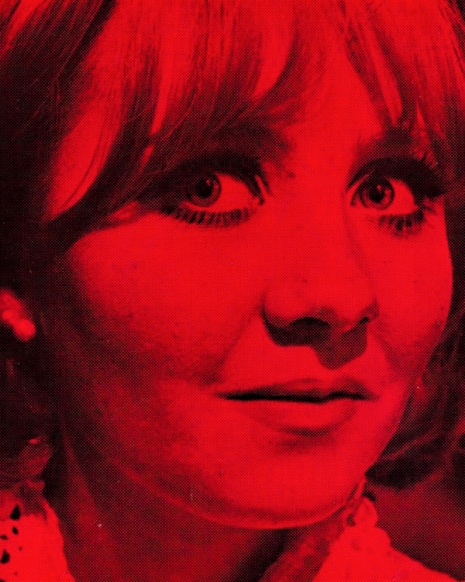
Scenes from an imaginary film about Lulu…
Prologue.
Glasgow 1951. Exterior night. A busy city street. Fogbound. Trams and buses gridlocked—their windows steamy, yellow-lit, blurred faces peering out into the darkness.
Inside one of the buses—a mother and daughter. The girl is about three years old. She is happy, singing quietly. The bus halts. People onboard groan frustratedly, complain about getting home. The girl looks at her mother. She wriggles free and stands in the middle of the lower deck of the bus. The girl is Marie McDonald McLaughlin Lawrie. She starts to sing. She has the voice of a “nuclear reactor” with the face of an angel. The passengers on the bus are enthralled. They can’t believe this tiny child has such a powerful voice. Marie belts out one song after another. The traffic starts to move. The passengers applaud and throw coins. This is Lulu’s first experience of fame.
Scene One.
Glasgow 1962: Exterior twilight. W/S of cranes and ships along the River Clyde and docks. The evening sky is bright orange. The buildings sparkle with the light from tenement windows. There’s a sound of distant traffic—blue trains rattling to the suburbs.
Cut to:
Interior Night: The Lindella Nightclub. Blue wisps of cigarette smoke, tables along one side of the room, a bar with a scrum of customers, eager to get drunk, happy to be out for the night. Backstage - a band, The Gleneagles, are ready to go on. They can hear the audience getting restless. The bass player asks if everything is okay? Over the sound system, the voice of the compere introduces the band. This is it. A ripple of applause, a rush, then the band is on stage.
At the rear, a young girl, who looks hardly in her teens, her hair bright red, sprayed with lacquer and rolled in curlers. She has a cold, but smiles, and looks confident. She holds a beret in her hand—wondering if she should wear it or not. The girl goes on stage. A pause. There’s feedback from the speakers. She checks with the band. The audience is getting uneasy. There are mutters, snide comments (“Away back to school, hen”) and sense of menace. Now fourteen years old, Marie Lawrie is about to change her life. The band is ready. Marie starts to sing.
Lulu: Wwwwwwwweeeeeeeelllllllllllllllllllllllllllll!!!!!!!
The voice is incredible. Little Richard, Jerry Lewis, and The Isley Brothers all rolled into this tiny redhead at the front of the stage.
At the back of the room—a woman stands slightly away from the crowd. She is mesmerized by the young girl’s performance. The audience that was about to riot are now lapdogs to this girl. The woman is Marion Massey—she is an agent—and she has just found her biggest act.
Lulu: (V/O) When I was fourteen, I was very lucky. I was discovered - to use a terrible term - by a person who was absolutely sincere. Since I was five, people had been coming up to me saying: “Stick with me, baby, and I’ll make you a star.” In fact, nobody ever did anything for me. Then Marion came along.
CU of Marion watching Lulu perform.
Marion Massey: (V/O) She looked so peculiar that first time I saw her. Her hair was in curlers underneath a fur beret. She had a terrible cold, was very pale and wore three jumpers. But I was very intrigued by her. There was something tremendously magnetic about this girl. I knew she had the makings of a great star.
Cut to:
London, 1964. Interior Day: Lulu performs on television.
Scene Two.
London 1965. Interior Day—a busy press conference. Behind a table covered with microphones sits Lulu with a vigilant Marion Massey. Cameras flash, TV crews jostle for best coverage, journalists talk over each other, shout their questions.
Reporter One: With all this success are you rich?
Lulu: I get £10 a week pocket money. I get through about £5 a week on taxis alone. They’re terribly expensive in London, but I don’t know my way about well enough to take buses and the only time I went on the tube by myself I got lost…
Reporter Two: What do you spend your money on?
Lulu: Shoes are my weakness, I’ve got eight pairs going at the moment plus two that have just about had it.
Reporter Three: Where are you staying?”
Lulu: At Aunt Janey’s.
Marion Massey: My Mother’s.
Lulu: Auntie Janey’s a wonderful cook. She does gefilte fish, boiled or fried.
Reporter One: Do you like it?
Lulu: Yes. I like it fried. (Pause) With ketchup.
Reporter Four: What’s going to be your next hit?
Cut to:
Interior Night: Lulu comes off-stage having finished singing “The Boat That I Row”. She is approached by writer and film director James Clavell—author of Shōgun.
James Clavell: That was wonderful.
Lulu: Thank you.
(Lulu is surrounded by fans who ask for an autograph. The fans disperse happy with their prized signature. Lulu turns to Clavell.)
Lulu: Are you wanting an autograph?
James Clavell: No, no. I just want to tell you…that er…well…You’ve got the part.
Lulu: What are you on about? What part?
James Clavell: I’m doing this feature film and I want you to be in it.
Lulu: Aye, right. Your patter’s pish by the way.
James Clavell: No seriously, you’ve got the part.
Cut to: Footage of Lulu in from To Sir, With Love.
Lulu: (V/O) I didn’t read for it or anything and I was afraid. All the other kids had been to acting school, and then working with Sidney Poitier! When I first saw the movie, I thought, “You cheeky thing, Lulu.” I crawled under a chair. All I could do was watch myself. The second time I saw it, I enjoyed the whole movie
Caption: Lulu’s single “To Sir With Love” sold four million copies worldwide. It was number one in the US for five weeks.
Montage of Lulu singing at various nightclubs in America—including the Coconut Grove—and newspaper headlines one with the banner including:
LULU WINS MOST PROMISING FEMALE VOCALIST.
Lulu: (V/O) Suddenly I’m sitting next to Frank Sinatra. He said to me, “Do you do any warm-up exercise for your voice because it’s very important?” Then he said, “You should come over, I could show you how to do it.” But I was hopeless at pushing myself forward. What was I going to say? “Give me your number, Frank. I’ll be in touch?”
Mind you, I was on a cloud. Frank Sinatra had kissed me on the cheek and that man was like a god in our house.
Cut to:
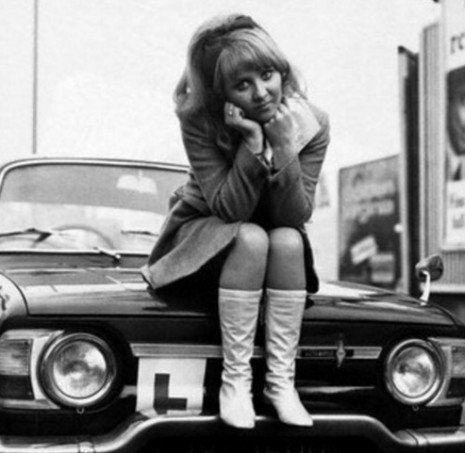
Scene Five.
Lulu is a star. She is one of the movers and shakers who shaped the 1960s.
Lulu dates Davy Jones from The Monkees. She regularly hangs out with The Beatles and The Stones. John Lennon plays her Sgt. Pepper at his home in Weybridge (“I didn’t know what to say—it was just incredible.”) She’s friends with a young Jimmy Page who was a session musician on her singles. She is also friends with a talented upcoming star Jimi Hendrix who she demands to have on her BBC Light Entertainment show much to the BBC’s annoyance. This was the famous performance when Hendrix stopped playing his own song and burst into a Cream track.
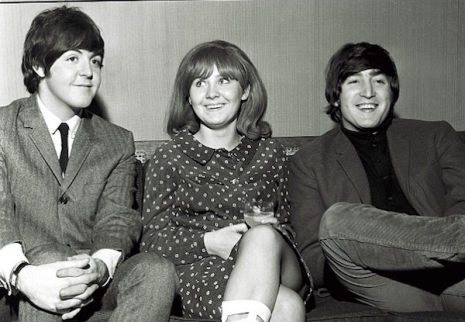
Interior Day: A TV Studio, London. Lulu sits in a fashionable chair opposite a suited BBC presenter. Shots from TV monitors and of floor manager counting the interview in, 5, 4, 3…
Interviewer: As a teenage pop star, don’t you think you’re missing out on a lot of things ordinary teenagers do?
Lulu: No, not at all, because, hmm. Well, first of all, I travel, I travel about so much, and I see so much. I’ve been to whole loads of places, girls my age have probably never been, you know. I’ve been to Paris and Germany, and I’m off to Poland with The Hollies next month.
Interviewer: What do you hope to do in your twenties when you’re no longer a teenager?
Lulu: Ah, well. Somewhere around my twenties I’d like to be married and have kids, you know. But I’d still like to be a singer.
Interviewer: Is it true you’re engaged?
Lulu: Actually. No. Nobody’s asked me.
Cut to:
B&W BBC News archive of the wedding between Lulu and Bee Gee Maurice Gibb.
News Reader: (V/O) Hundreds of people have clamored to see the marriage of popstars Lulu and Maurice Gibb of the Bee Gees in a Buckinghamshire church.
Lulu, 20, had hoped to keep her wedding plans secret but around one thousand people - mostly women and girls - filled the grounds of St James’ Church in Gerrards Cross. Several children were hurt as the crowd - that had waited for an hour - surged forward when Lulu arrived in her green Rolls Royce, twenty minutes late.
Wearing a long, white, mink-trimmed coat with fur hood and a white, silk mini-dress, Lulu - born Marie McDonald McLaughlin - begged onlookers to let her through, saying, “Please let me in, please let me in.”
As police formed a cordon to allow the bride to reach the church, Maurice Gibb - also wearing white - waited inside with his best man, twin brother Robin, who was married only three months ago. The third Gibb brother Barry arrived ten minutes later, after earlier objecting to the wedding saying the couple was too young. The Bee Gees and the bride were the only celebrities at the small, family wedding.
After a half-hour service - presided over by Reverend Gordon Harrison - the newlyweds were trapped in the church for another ten minutes until a path had been cleared to their waiting car. They spent a few minutes at the nineteen-year-old groom’s parents’ house in Gerrards Cross before traveling to London for their reception.
After a one-day honeymoon Lulu plans to return to work on her BBC television series. She says she wants to cut down on her workload to concentrate on her family and wants lots of children.
The daughter of a Glaswegian butcher, Lulu has already enjoyed a successful singing career for five years - beginning with number one single, “Shout.” She will represent the UK at the Eurovision Song Contest in March.
Cut to:
Caption: Eurovision Song Contest 1969 - Lulu sings Britain’s entry “Boom-Bang-A-Bang” which comes joint first.
Scene Six.
Photographs of Lulu and Maurice.
Lulu: Maurice never slept. He’d stay up with his pals and his scotch and Coke. I would drink but I’d have to go to bed because I was always doing a television series and I had to sleep. But Maurice would soldier on, filming, recording, drinking and whatever else.
I don’t know if I ever really saw any cocaine. I might have done but I wouldn’t have liked being near it. I’d be afraid.
We thought we were invincible. We were kids – you don’t think anything is going to go really wrong – we believed we were going to live happily ever after.’
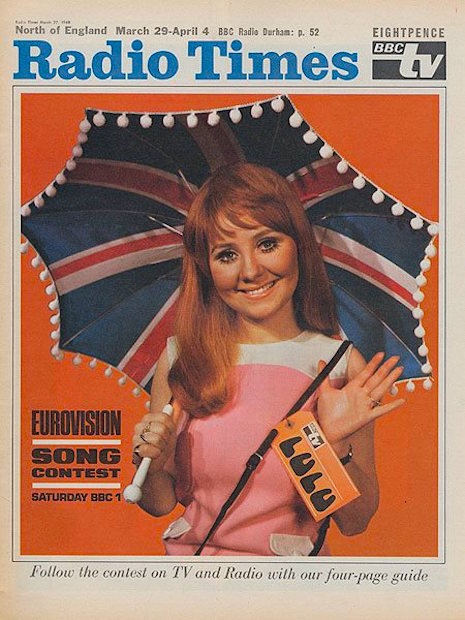
Cut to:
Montage of Lulu singing in TV studios, recording suites, at photo shoots.
Lulu: (V/O) I got patted on the head a lot by the boys in my band. That irritated the shit out of me because I thought I was a liberated woman and I had a hit record. Trying to get my input accepted by male producers was very difficult, too. They saw me as a little cute thing.
Cut to:
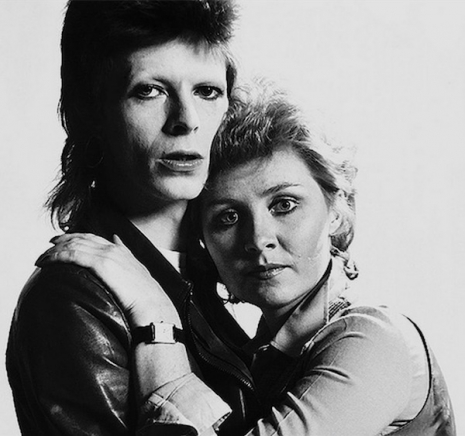
London 1974: Interior Day. A decade on from “Shout” Lulu is in a recording studio with David Bowie. They are about to cut a single. Bowie sits with a saxophone. Lulu is next to a microphone, hands on hips, headphones on. They are dressed in similar trouser suits. There is a group of musicians around them—Bowie’s Ziggy Stardust band.
David Bowie: Okay, I’ll go like that. Each one. I won’t argue. Play it with a little more guts, Trev. We started a bit too relaxed, you know.
Lulu: Left.
David Bowie: Let’s hit it as a single, not as an album track, all right? One, two…
Cut to:
Lulu: (V/O) I was involved with Bowie. We were so connected because of the music – it was the personal stuff that was… odd. He was Mr. Charm – he totally had that gift. When he talked to you, you were the only person in that room, the rest of the world kind of dissolved – it was like being hypnotized. He really was something else. A one-off.
Epilogue.
Next up for Lulu was one of the rarest honors in showbiz when she was picked to voice a coveted James Bond theme song for The Man with the Golden Gun,
Lulu: (V/O) My life was a whirlwind. I’ve had the most unbelievable life. Up and down, pillar to post, I’ve been to hell and back. But I’ve lived.
Most of the time I was living in “Lululand” and it was so exciting because I was making music. That’s what really counts. That’s what I do. I’m a singer—that’s who I am.
Today, Lulu still performs and records—most recently her highly acclaimed five star rated album Making Life Rhyme in 2015. She also acts—appearing in Ab Fab: The Movie in 2016. Since the 1990s, Lulu has been co-writing her own songs—most notably the international hit “I Don’t Wanna Fight” for Tina Turner. Lulu is the only British female artist to have a hit in each decade of her career. Long may that continue.